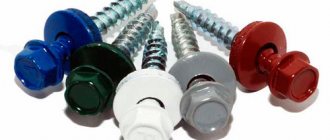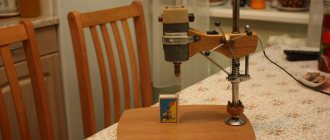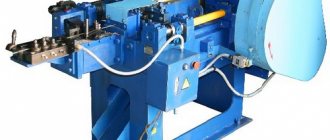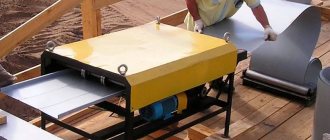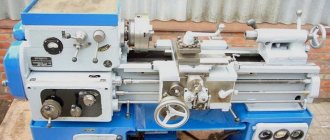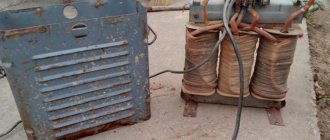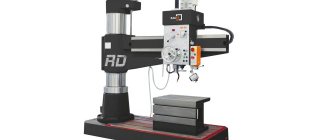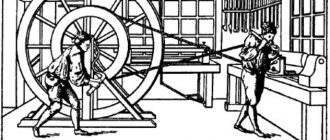Self-tapping screws are an important component of the construction business; they are a necessary attribute for various production processes. Therefore, the production and sale of fastening materials in Russia is becoming a profitable and promising business idea.
The advantages of this direction include:
- high added value;
- simple conditions for organizing a workshop;
- long shelf life;
- availability of raw materials;
- all processes are automated, you do not need to hire many employees.
Before choosing the necessary equipment, you need to know the manufacturing procedure:
- A drawing machine is used to prepare raw materials.
- The cold heading unit forms blanks.
- A thread rolling machine creates threads on them.
- Next, the workpieces enter the furnace for hardening.
- Chemical treatment is carried out to prevent premature corrosion.
- Drying the product.
- Quality check and packaging.
From the description of the technology for creating self-tapping screws, it becomes clear that to produce products you will need two main machines and additional equipment.
Self-tapping screws of different types
Description and purpose of the device
A machine for the production of self-tapping screws is a unit with which threaded fasteners are produced. Self-tapping screws are used to fasten various objects. Their production is always relevant. They are produced by cold stamping . The materials used are brass and steel blanks.
The operating principle of the equipment is simple. The wire enters the machine. It is cut into pieces and stamped. Next, the machine applies the thread.
A machine for producing self-tapping screws may be needed for:
- Construction and repair company.
- Home workshop.
- Industrial enterprise.
Machine CTR6HN - price 954,300 rub.
Self-tapping screw production technology
Technological processes in the production of self-tapping screws begin with the selection of suitable steel; it can be carbon, brass, or stainless. Raw materials are purchased at specialized metal rolling plants, in the form of a rod or wire. The production of self-tapping screws is similar to the production of nails, but the process differs in some nuances and equipment requirements. The production of self-tapping screws requires specially prepared equipment and occurs in stages:
- A blank is created from metal wire of the required diameter. The length of the workpiece must correspond to the finished product; cold heading equipment is used to make the cap.
- Before applying the thread, the self-tapping screw blanks enter a hopper, where they are prepared for transfer to the machine on which the thread is applied.
- The parameters of strength and endurance of self-tapping screws, in accordance with the declared indicators, are achieved by hardening in an oven. The temperature reaches over 900 degrees, then the metal tension is released in a furnace at a lower temperature.
- The anti-corrosion properties of an almost finished product are achieved by immersing them in special baths, the galvanic coating is applied in stages, and at the end it is treated with an electrolyte from zinc anodes to consolidate the result.
When producing screws, a machine called a centrifuge is used for drying, after which you can see the finished product. The size of production affects only the throughput of the machines and machines used; control over the quality of products and the production process can be carried out by one person.
Factors influencing price
It’s difficult to say exactly how much a machine for making self-tapping screws will cost. The price of the unit is affected by:
- Performance.
- Functionality.
- Quality.
- Control type.
- Design features.
- Type of unit.
- Dimensions.
- Technical condition.
- Manufacturing company.
- Implementer's pricing policy.
- Delivery required.
Machine FET-ID5x85 - price 1,482,300 rub.
Summary
To summarize, I would like to note that, despite the apparent simplicity of this type of business, you may encounter a number of problems, ranging from finding qualified workers and raw materials to opportunities to sell your products.
If you cannot agree on sufficient sales of finished products, preferably on an advance payment basis, then you risk investing significantly more money than originally planned. After all, part of the finished product will be in the warehouse, and accordingly you will receive less profit.
The production equipment, although automatic, still requires little human intervention. If the equipment turns out to be of poor quality, then repairing it can be expensive, because production will stop during the repair.
If you are not a beginner and know how to make self-tapping screws, then you will be able to handle this type of business, such as the production of hardware. And with good communication skills, you can easily sell all products and increase production. So, this type of business is likely to be successful for a competent person with at least minimal knowledge of production.
Types of machines
Depending on the control method, you can purchase the following unit:
- Semi-automatic.
- Auto.
According to the principle of operation, equipment is distinguished:
- Cold heading . Cuts blanks and forms heads. It is divided into units with semi-protective and fully protective casing. Needs adjustment and special technical care.
- Thread rolling . It has a replaceable die that rolls threads.
Based on size and power, the following models are distinguished:
- Mini machines.
- High-power installations.
Depending on the technical condition, you can purchase the machine:
- New.
- Used.
According to the country of manufacture, the unit can be:
- Imported.
- Domestic.
You can buy a machine for making the following self-tapping screws:
- On wood.
- For metal.
- Universal.
Depending on the manufacturing company, you can take a machine of the following brand:
- LianTeng.
- SAMSTAL.
- INNOR.
- FOB.
- Candid.
At the place of purchase, the equipment may be:
- Purchased from a local specialty store.
- Ordered from an online trading company.
- Taken from a private advertisement.
- Purchased directly from the manufacturer's warehouse.
Machine WN0564 - price 727,250 rub.
Recommendations for raw materials
When choosing raw materials, many parameters must be taken into account. This includes both the type of products manufactured and the features of equipment for self-tapping screws. For example, it is better to make roofing screws from high-carbon steel with a high hardness coefficient. Wooden elements are usually fastened with stainless steel screws. Brass fasteners do not require additional drilling. They are used in construction when performing finishing work.
You can purchase the material in the form of wire of a specified diameter or in the form of a blank.
There are now many large metal rolling plants in Russia. There are no problems with the supply of raw materials for both small workshops and large enterprises. The fundamental points here can only be the cost of the material and the timing of its delivery.
Approximate prices
In Russia, new machines for the production of self-tapping screws are sold for 170,000-2,570,000 rubles . Approximate prices for equipment depending on productivity and country of manufacture are shown in the table.
| Types of machines by country of manufacture | Productivity in pieces per minute | Minimum cost in rubles |
| Domestic | 50-70 | 170000-200000 |
| Chinese | 250-300 | 500000-700000 |
| German, Austrian | 300-500 | 1500000-2200000 |
The cost of units for the production of self-tapping screws of popular models is shown in the table below.
| Brand | Country of Origin | Unit type | Cost in rubles |
| 4R-40 | China | cold heading | 1112595 |
| CTR6HN | Taiwan | thread rolling | 954300 |
| FET-ID5x85 | China | cold heading | 1482300 |
| CTR8H | Taiwan | thread rolling | 1284630 |
| WN0564 | China | cold heading | 727250 |
| YH 1552 | Taiwan | cold heading | 2570000 |
| AS3016 | Russia | cold heading | 220200 |
Machine YH 1552 - price 2,570,000 rub.
Used machines for making self-tapping screws are sold at prices ranging from 100,000 to 1,200,000 rubles .
Financial issue
Provided that permanent sales channels are established, the net annual profit from the production of screws and self-tapping screws can be very significant. But first, let's talk about costs. So, an approximate list of annual expense items is as follows:
- Rent of production premises – 1.2 million rubles.
- Salary to employees is about 90 thousand rubles for the first month.
- License to carry out activities – 25 thousand rubles
- Purchase of raw materials – from 175 thousand rubles.
- Unforeseen expenses and losses – 300 thousand rubles
- Utility bills – 350 thousand rubles.
It turns out to be quite a tidy sum. However, not everything is so scary, because the equipment’s capacity allows us to produce up to 140 thousand screws and self-tapping screws per day. The average market value of one product is 20 kopecks. Accordingly, you can get about 28 thousand rubles per day, 600 thousand per month, and 7.5 million rubles per year.
Now let’s subtract the total amount of all expenses and get a very pleasant figure, indicating a net annual profit of 4 million rubles. With an initial investment in this business of about 1.5 million rubles, the payback period will be no more than six months.
Staff
The advantage of automation is that you don't have to hire many workers. After delivery, the manufacturer performs the initial setup of the machines. The craftsmen are left to monitor their work and ensure the continuity of the production process.
No more than two or three people will be required per shift. They must undergo special training and be able to operate machines. They can also be storekeepers, deliver raw materials to the workshop, store finished products, and load them into vehicles.
You will also need a driver with a car, an accountant (can be hired through outsourcing), a sales representative who will negotiate with networks and construction companies (the entrepreneur himself can take on this work at first).
Industrial production of wire nails at home
Ordinary nails are made from unfired wire. The material is cast iron with the following characteristics:
- C 0.18-0.25%;
- P 0.02 – 0.06%;
- tensile strength at elongation of no more than 28%, 45-50 kg/mm2, obtained by the Thomas process.
Serrated nails are made from wire, which after drawing is annealed, etched with dilute sulfuric acid, followed by slaking with lime milk and drying. Then they are stretched and straightened on wooden cheeks.
Nails with thin heads of large diameter, including tar paper, are made from high-quality Siemens-Martin cast iron with the characteristics:
- C 0.03%;
- P up to 0.03%;
- tensile strength with elongation up to 34% and simultaneous reduction in diameter up to 75%, 34-37 kg/mm2.
After drawing to a diameter close to the specified one, the wire is annealed, scale is removed from it and the rigidity is increased by drawing in 1 stroke.
Sales of finished products
When using new generation equipment, it becomes possible to produce products in small batches of various formats. A simple analysis will allow you to determine the most popular fasteners on the market and competently organize sales.
A professionally drawn up business plan provides various sales opportunities:
Concluding contracts with large construction companies, manufacturers of furniture, windows, doors. Conclude agreements for the retail supply of products to local stores and retail chains. Selling self-tapping screws through your own business card website.
To attract customers, it is optimal to set competitive prices, but you should not significantly reduce them. A novice entrepreneur needs to remember that it is very difficult to increase the cost of products with concluded contracts.
It is noteworthy that as productivity increases, production costs decrease. It is to increase production and sales volumes that every entrepreneur should aim. An increase in income allows you to expand your own workshop to the scale of a plant and enter into long-term contracts for the supply of metal structures.
Choosing the optimal tax regime
In the all-Russian classifier of economic activities, the business of producing self-tapping screws has code 25.94 OKVED 2. This means that you can work and pay part of the money you earn to the budget under a simplified taxation system. In this case, you can deduct 6% of the total turnover or 15% of the difference between gross income and expenses to the state treasury. In the latter case, you must have all the documents confirming the company's expenses.
For entrepreneurs who plan to organize the operation of a large plant, focusing not only on the domestic market, but also on buyers abroad, it is best to work under the general taxation regime. To do this, you will have to hire 1-2 accountants, but for a serious enterprise, this is quite normal practice.
Are you thinking about where to invest and what business to start? Watch our free courses on investing and making money. Perhaps they will help you choose the right path or suggest a new idea for making money.
See also several similar premium business plans:
- Business plan for furniture production
- Business plan for pellet production
- Business plan for a brick factory
- Business plan for the production of paving slabs
- Business plan for cinder block production
- Business plan for the production of artificial stone
Workshop employees
When hiring workers for your production, special attention should be paid to their qualifications. Despite the fact that wages for skilled workers are higher, you can still save a lot
A more qualified craftsman will be able to produce high-quality products in a shorter time. And this, in turn, will not only lead to cost reduction, but will also increase the prestige of your products due to improved quality.
The wages of workers can be either fixed or depend on the quantity of products produced. At the beginning of production, when the sales market has not yet been established, it is worth offering workers a fixed payment and small bonuses if the production plan is fulfilled. Then, when you already have established sales channels, you can transfer your employees to piecework-bonus wages, which will encourage them to produce more products with high quality.
Where to begin?
Carefully drawing up a well-thought-out business plan guarantees 50% of the success of your business. But, before you start planning, do not forget to go to the Federal Tax Service branch of your city and register an individual entrepreneur. This procedure does not take much time, and the amount of the state fee for registration is purely symbolic - 800 rubles. Armed with a pen and paper, first think through and answer the following questions in as much detail as possible:
- Where to rent a room?
- Which manufacturers should you buy raw materials from?
- Which equipment is better to purchase (new or used)?
- What will be the number of items in the product range?
- Where to find conscientious employees?
- Who should sell the products to?
Having answered (at least partially) these questions, you can safely proceed to the next stage of implementing this business idea - finding a suitable premises.
Renting a production workshop with an area of 500 to 700 square meters is not an easy task. You should look for premises either outside the city limits or at the maximum distance from residential areas - noise pollution from working machines will be quite significant. The workshop must fully comply with sanitary and fire safety standards and be connected to a stable electrical network.
The average price in the Central Federal District for renting such premises is approximately 100 thousand rubles. Monthly utility costs will fluctuate around 15 thousand rubles. Solving the next issue regarding the purchase of raw materials and equipment will require even more significant nervous and financial costs.
Preparing the premises
You need a room of about 100 square meters. m. There will be a production workshop with equipment, warehouses for raw materials and finished products, staff premises, and a place for loading/unloading goods.
The premises may be located on the outskirts of a populated area. It must be connected to the electrical network, a power cable (the equipment will consume a lot of energy), and must comply with fire and sanitary safety conditions and be connected to communications. An important condition is the availability of automobile access to the site.
Production premises should not be rented far from sales markets, since costs for fuel and fuels and lubricants increase unjustifiably. It is better to rent equipped empty space at a large enterprise.
Investments
The main cost item for starting a business is the operating line for the production of screws, which operates automatically. Automation is more expensive, but more profitable in the long term. You don't have to hire a large staff.
| Expense item | Cost, rub. |
| Registration | 10 thousand |
| Premises for rent, 100 sq. m | 50 thousand |
| Equipment | 2 million |
| Raw materials, months norm | 150 thousand |
| Salary, 4 people. | 100 thousand |
| Additional expenses | 200 thousand |
| Total | 2.51 million |
The cost of renting premises is indicated subject to working in a city with a population of up to 500 thousand people. We rent premises that are ready for use and do not require major repairs. The costs of all preparatory work are included in additional costs.
